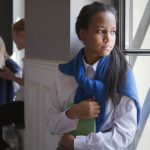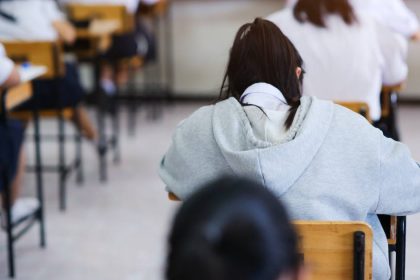When proud Aboriginal man Gary Fry sets his mind to something, he’s destined to achieve it.
After completing an electrical apprenticeship many years ago, where he worked on the construction of new schools, the Dagoman (Jorrolam) man of the Katherine region in the Northern Territory decided he instead wanted to be a teacher.
“I wanted to be a part of something that was bigger than me and which was about community building. So, I went on to be a teacher and then I became a school principal,” says Associate Professor Fry.
With the support of the Deputy Vice-President Indigenous Engagement, Professor Adrian Miller, Associate Professor Fry is now the head of First Nations Studies at CQUniversity, where he leads the Learning and Teaching First Nations Studies team, which focuses on embedding First Nations curriculum across all CQU courses and its delivery within a First Nations cultural competency framework.
“I became an academic because the problems happening in education that I was experiencing as a teacher and then later on as a school principal weren’t getting resolved – for Indigenous and non-Indigenous kids – and I thought I needed to try and take my voice further,” Associate Professor Fry says.
He says he’s now determined to drive the university forward when it comes to First Nations education.
“This change agenda that we’re embarking on is occurring at all levels of the University from the Vice Chancellor and President, the Chancellor, University Management Committee, the University Council and First Nations Council of Elders and Leaders,” Associate Professor Fry says.
“It’s because of that support and the willingness from the very top that we are going to achieve something big. What we are doing in committing to institutional change is extremely unique and reflects a significant response to the Australian Universities Accord-final report 2024, particularly towards increasing the level of First Nations student enrolments and completions across Vocational Education and Training and Higher Education courses.”
Cultural Learning and Competency program
Associate Professor Fry says the University would continue to deliver the First Nations Cultural Learning and Competency Program, with an expansion of targeted staff and associated learning content and changes to delivery in 2024.
“This year our training will comprise a combination of master classes (replacing the 2023 extended delivery model) and micro-credential course opportunities,” he says.
Associate Professor Fry says some 450 CQU staff attended workshops in 2023.
“The overwhelming majority of participants enjoyed the workshops and believed participation had improved their knowledge, skills and confidence in the embedding of First Nations curriculum and its delivery within a First Nations Cultural Competency Framework,” he says.
“Staff respondents also strongly endorsed a continuation of the training opportunities across 2024.”
Additionally, 652 staff – or 90 per cent of CQU’s workforce – completed the First Nations Cross Cultural Competency for CQUniversity Staff micro-credential.
Master classes and their aligned micro-credential courses that are either already being delivered in 2024 or in final stages of development include:
- Embedding First Nations Cultural Competency in Teaching and Learning (aimed at teaching staff)
- Embedding First Nations content across the CQU Curriculum (aimed at teaching staff)
- First Nations Cultural Awareness Training (Level 1) (aimed at all staff)
- Embedding First Nations Research across CQUniversity (aimed at research – focused staff)
- First Nations Cultural Safety Training (Level 2) (aimed at all staff)
- First Nations Cultural Competency Training (Level 3) (aimed at all staff)
“When people see themselves inside the learning, that’s when it becomes more impactful, and it becomes more meaningful for people.”
Reconciliation Action Plan and success strategy
Associate Professor Fry says a new Reconciliation Action Plan (RAP) was currently being developed and led by Dr Gary Jones in the Office of Indigenous Engagement and the RAP Committee.
“There’s different levels of RAP and the existing one is about innovating new ideas, new ways of doing change, and around reconciliation,” he says.
“There’s a new Stretch RAP being developed which is taking these initiatives and stretching them further into the future. And we’re serious about our commitment to the RAP. I don’t know of any other university in Australia that’s doing this at this level where the schools and colleges, and the divisions across the university have key performance indicators that hold accountability mechanisms – people can’t ignore it.”
He has also been working on a First Nations Education and Student Success Strategy 2024-2028 which, when launched, will be a first of its kind for any Australian university.
“The strategy has been developed in response to CQUniversity’s long-term pattern of low completion rates for First Nations students across higher education and vocational education and training courses,” he says.
“Since 2013 there has been a strong increase in First Nations student enrolments across CQUiversity
courses, signalling that more than ever our Indigenous communities are wanting to engage with the tertiary education and training sector. Unfortunately, as the performance data sadly shows, the overwhelming majority do not complete their chosen course. This has a profound and negative impact on our students, their families and communities because with every drop in retention the wounds of failure run deep and adds to a perception that tertiary education is unattainable.”
Change on the horizon
Associate Professor Fry said the Australian Universities Accord final report 2024 makes clear that in order to overcome this entrenched pattern, new paradigms are needed that shift understanding in respect to how this is problematised in ways that can levitate students (and the University) from this condition.
“The First Nations Education and Student Success Strategy 2024-2028 responds to this call.”
What’s appealing about this role, he says, is that “I’m a part of an institution that really wants to see holistic change”.
“The work that I’ve been really careful to try to cultivate in this university has been about recognising that we are all in this together.”








